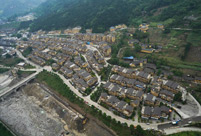 First overseas "China-standard" electric railway laid
First overseas "China-standard" electric railway laid
 College graduate launches organic agricultural cooperative in hometown
College graduate launches organic agricultural cooperative in hometown Guizhou Earthquake Emergency Rescue Team takes part in emergency exercises
Guizhou Earthquake Emergency Rescue Team takes part in emergency exercises Giant Spider-Man appears in Fuzhou
Giant Spider-Man appears in Fuzhou
 Beautiful Chinese-built roads in Africa
Beautiful Chinese-built roads in Africa Sagya Monastery in Tibet
Sagya Monastery in Tibet
 Young Chinese drive consumption
Young Chinese drive consumption
 The life of a model: Not as glamorous as it seems
The life of a model: Not as glamorous as it seems
 Hello Kitty, happy 40th birthday!
Hello Kitty, happy 40th birthday!
 The Western Qing Mausoleum
The Western Qing Mausoleum
BEIJING, May 18 -- An Australian expert told Xinhua Sunday that China owns sovereignty over the location of its drilling operations that stoked Vietnam's opposition and anti-China violence.
The rig that China is operating is 80 nautical miles from China's Yongxing Island, which is indisputably an island under the regime of islands in the 1982 UN Convention on the Law of the Sea (UNCLOS) and thus entitled to an Economic Exclusive Zone (EEZ) and continental shelf, said Sam Bateman, a senior fellow S. Rajaratnam School of International Studies (RSIS) of the Singapore-based Nanyang Technological University.
Bateman added that "despite global commentary that suggests otherwise, a negotiated maritime boundary in this area would likely place the rig within China's EEZ even if reduced weight was given to China's claimed insular features."
Vietnam claims that because the rig is closer to its mainland coast than to China's and well inside 200 nautical miles of its coast, it lies within its EEZ and on its continental shelf, Bateman said.
However, he said this argument may appear attractive but geographical proximity alone is not an unequivocal basis for claiming sovereignty or sovereign rights.
"There are many examples around the world of countries having sovereignty over features well inside the EEZ of another, or of EEZ boundaries being established significantly closer to one country than to another," Bateman said.
Bateman is also a former Australian naval commodore with research interests in regimes for good order at sea. He said Vietnam' s current claim over Xisha Islands is seriously weakened by North Vietnam' s recognition of Chinese sovereignty over the islands in 1958 and its lack of protest between 1958 and 1975.
A number of governments, including the United States, have explicitly or implicitly recognized Chinese sovereignty over some or all of the islands, Bateman argued.
The US has urged the claimant countries to exercise care and restraint. Against the historical background of American acceptance of China' s sovereignty over Yongxing Island, it would be hypocritical now for Washington to make any stronger statement that might be seen as supportive of Vietnam' s position, Bateman said.
 A bite of Jiang Nan
A bite of Jiang Nan PLA's tough exercises
PLA's tough exercises Best photos of the week
Best photos of the week  When we are young...
When we are young... Wedding photos of world champion
Wedding photos of world champion "The Most Beautiful Chinese Land"
"The Most Beautiful Chinese Land"  Men experience pains of childbirth on Mother's Day
Men experience pains of childbirth on Mother's Day  J-11 fighters training in complex meteorological conditions
J-11 fighters training in complex meteorological conditions Six years after Wenchuan earthquake
Six years after Wenchuan earthquake  8 great movies to watch with your mom
8 great movies to watch with your mom China's most luminous celebrities
China's most luminous celebrities Newly recruited police in Hetian hold drill
Newly recruited police in Hetian hold drill  Bird-men compete flying in Hong Kong
Bird-men compete flying in Hong Kong  The 'Chinese Dad'
The 'Chinese Dad' Shanghai locals bid farewell to childhood memories
Shanghai locals bid farewell to childhood memoriesDay|Week|Month